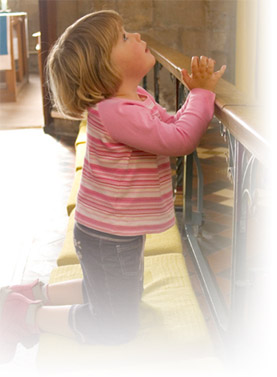Sunday Sermon for March 13, 2011, the First Sunday of Lent, Year A
Readings: Gen 2:7-9, 3:1-7; Rom 5:12-19; Mt 4:1-11
In the Gospel reading today we hear about the Lord being tempted in the desert. The Church aligns this reading with the original temptation of the first man and woman. The reason for this is given plainly in the second reading when St. Paul tells us that by one man’s disobedience all sinned, but by the obedience of one man all are made righteous. This being the case, we will find that many points regarding the two passages will be exactly opposite.
The first is the most obvious: obedience and disobedience. However, the opposites could not be made more much clearer than a garden as opposed to a desert. Adam and Eve had all that they wanted to eat; Jesus had fasted for forty days and forty nights and now He was hungry. Adam and Eve acted out of pride and selfishness; Jesus acted in humility and charity. Eve, relying on her own strength and ability, enters into a discussion with the serpent and twists God’s words (God never said they die if they touched the fruit, only if they ate it). Jesus, keeping His focus on His Father, does not discuss anything with the evil one but uses the Word of God to counter and rebuke him.
Fast forwarding three years from the time of the temptations, we find our Lord executing that one righteous act by which we are made righteous. Again, in the restoration, you will find the opposites of what happened at the Fall. This time it is in a garden but there is a tree, a man and a woman. But in this garden there is only one tree, the Cross, the very place where knowledge of good and evil meet. On the surface it seems that sin is triumphant and death is the consequence. But, in fact, love is triumphant and the Cross becomes the tree of life, the fruit of which we can now eat.
All of these points become important because St. Paul tells when Adam sinned death came to all inasmuch as all sinned. Now, through one righteous act, life and acquittal come to all. How can St. Paul say that we all sinned in Adam and that we are all made righteous in Jesus? The ancient way of understanding things is that generation comes through the father and, as such, all future descendents are considered to be contained within the seed that produced the first offspring of that line. Since everyone has physical descent from Adam and Eve, every person who would come into the world from the point of the sin forward is considered to be “in” Adam.
For those who are baptized, we have been made members of Jesus Christ. Therefore, whatever happens to Jesus, happens to us, and vice versa. Recall that our Lord told us that what we do to the least of His brothers we do to Him. The difference here is that we have no say in our physical lineage, but we do have a choice about whether or not we want to be part of Jesus. We like the ideas of the forgiveness of sin and the righteousness that comes from Him; we also like the fact that He takes to Himself whatever happens to us. However, we seem not to like the Cross, the rejections, the insults and all of the other negative things that happened to our Lord. Interesting that we like it when He unites Himself to us in our negative things but we do not want to unite ourselves to Him in anything that appears negative to us.
Sin and death have been passed down to us through generation, but all of us have committed more than our own share of sins. For this reason we cannot put all of the blame on Adam and Eve; after all, if they had not done fallen, we can each say, I probably would have. Forgiveness and life have been passed on to us through regeneration. If we have been so willing to share in the sins of our first parents we now have to be willing to share in the work of righteousness that comes through Christ.
As Lent begins, we each need to look at the areas of sin in our lives and consider what needs to happen to overcome them. The grace is there from the Lord, but are we willing to take up our cross and be crucified with Him? This means carrying our cross by dealing with the temptations to reject our resolutions and fall back into our old sinful patterns and it also means nailing our sins to the cross, cutting ourselves off from the death that has come from eating of the forbidden fruit and reaching out, instead, to the Tree of Life and its fruit, the Eucharist.
Fr. Altier’s column appears regularly in The Wanderer, a national Catholic weekly published in St. Paul, Minn. For information about subscribing to The Wanderer, please visit www.thewandererpress.com.

